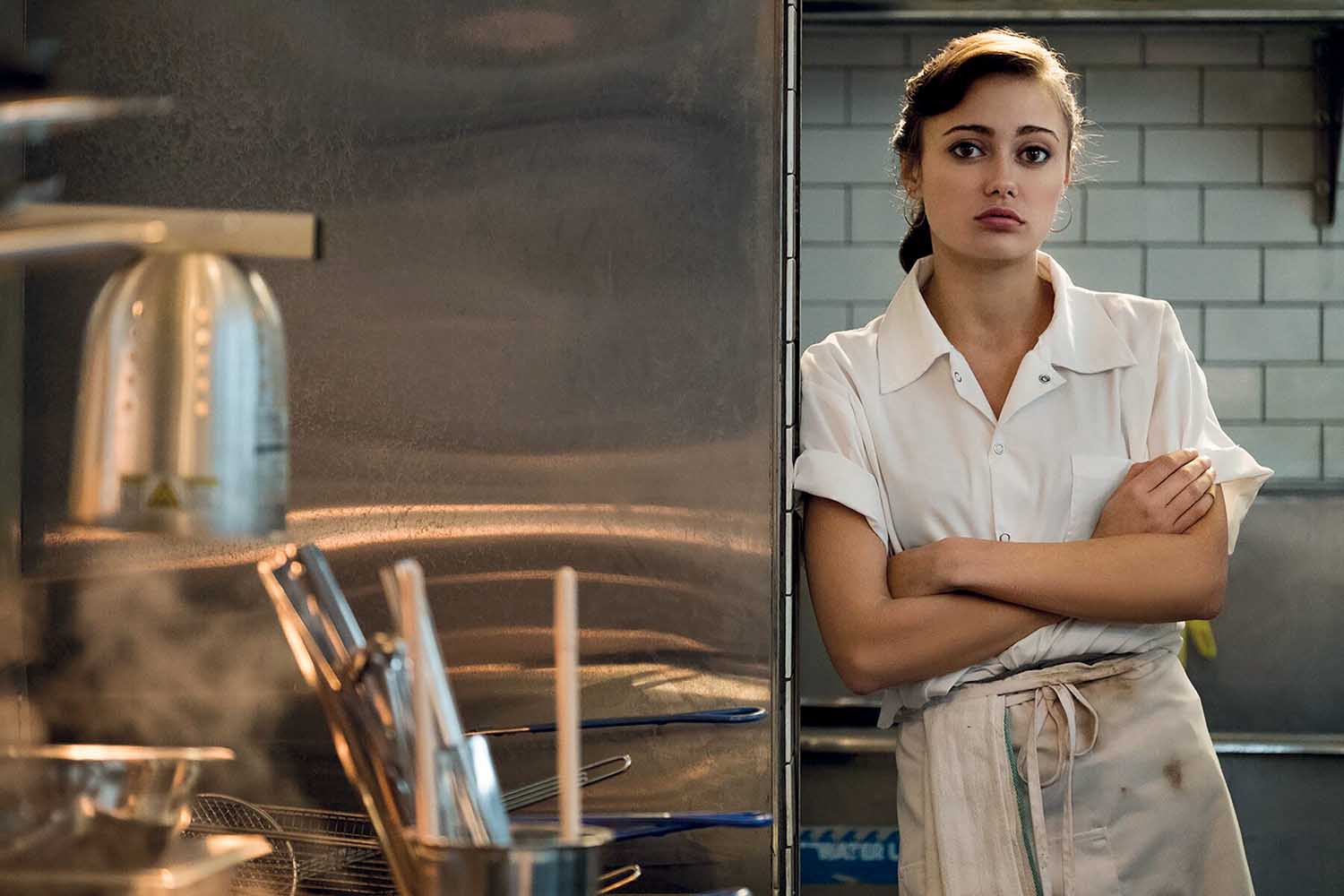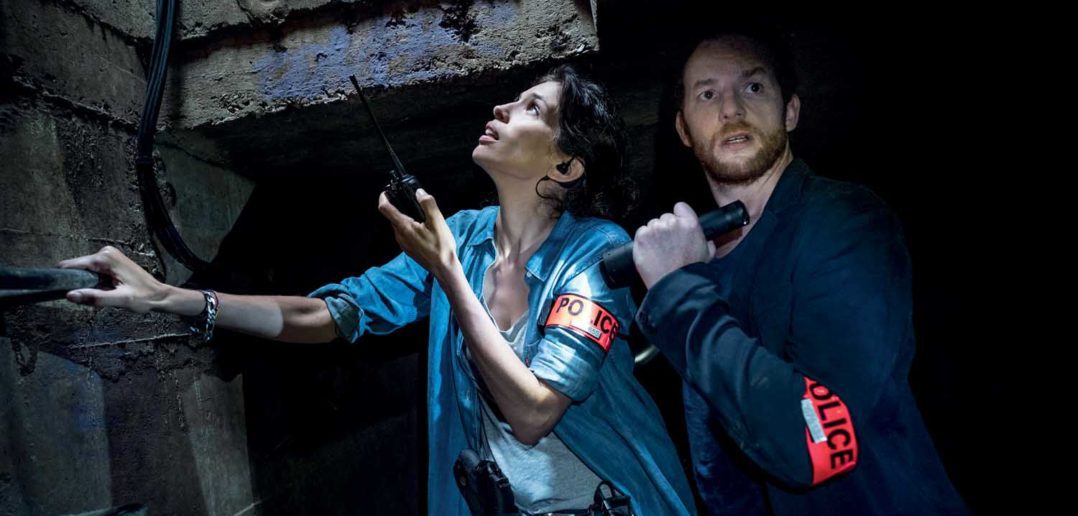Almost three years on from FX Networks CEO John Landgraf’s “peak TV” declaration that there is “simply too much television”, the creative arms race between Netflix, Amazon, Apple, Hollywood, and international broadcasters and distributors, means the choice available to audiences continues to grow and grow. The challenge for producers and distributors is how to get noticed when there is so much to watch. The answer, according to Gary Marenzi, head of entertainment sales and partnerships at Endeavor Content (a supporter of In Development), is to invest in quality. “Leading broadcasters and subscription channels are looking for high-profile series that break through the clutter and find significant audiences,” he says “We look for projects from established showrunners and directors, with well-known actors attached.”
Marenzi says Endeavor’s MIPTV slate illustrates this approach. Titles on display include psycho-thriller Killing Eve (shortlisted for the CANNESERIES competition), Agatha Christie drama Ordeal By Innocence and Little Drummer Girl, the follow-up to The Night Manager from The Ink Factory. There is also The First, a near-future Mars adventure penned by Beau Willimon and starring Sean Penn.
The emphasis on top talent means that the trend towards limited series continues. “These feature well-known brands or casts that can be heavily promoted,” Marenzi says. “And with six-to-10 episodes, they can be programmed in short bursts for maximum impact. The buyer can build a franchise that is repeatable if the show succeeds, and they are only investing in a limited number of episodes in the initial season, so it doesn’t use up most of their budget.”
Such is the range of potential buyers that Marenzi says there is room for most genres. He stresses, however, that there are still market staples: “Well-told stories from any genre will find an appropriate home, but it’s always good to have shows that can be embraced by as many buyers as possible. Blue-sky adventure, police and spy stories, and ground-based supernatural shows perform well across a wide range of territories. Sci-fi is growing beyond its traditional strongholds of North America, the UK and Germany as the world becomes more tech-savvy. Female-driven projects are highly prized as the female 18-49 age demographic drives a lot of audiences around the world. In general, there has been a move away from stories that are very dark but, as subscription services increase their budgets, it’s only logical that many of their programmes will be edgier that those on free TV and basic cable.”
Caroline Torrance, head of scripted at Banijay Rights, agrees that there is growing interest in series with strong female leads: “I think it reflects the need to bring something positive to the film and TV industry after all the recent revelations.”
In terms of content trends, Torrance points to sci-fi, fantasy, lighter series and premium period shows. “But crime drama is also in high demand,” she adds. “We hear a lot about channels wanting lighter series and that’s true — but our Scandinavian crime series are selling better than ever.”
On Banijay Rights’ slate, the third season of Versailles opened the CANNESERIES festival. Produced by Capa Drama, Banijay Studios France and Entre Chien et Loup for Canal+, season three opens after Louis XIV has won a war against Holland. But as the politics and power struggles play out, a prisoner, hidden behind a mask, presents a new threat to the Sun King.
Banijay’s slate continues to showcase drama from mainland Europe. “Swedish family drama The Restaurant has been commissioned for a third series and there’s a second series of eerie drama Black Lake,” Torrance says. “There’s a new series of Belgian drama Public Enemy and new dramas from Yellow Bird, including fantasy thriller Hidden and psychological drama The Truth Will Out.”

There is also an interesting hybrid project reminiscent of Lilyhammer in the form of Banijay Denmark and New Zealand co-pro Straight Forward. Created by John Banas, Torrance describes it as “an intricate mix of crime caper and a voyage of discovery, as a Danish woman attempts to leave her criminal past behind her by moving to New Zealand”.
Torrance also reports an increased interest in formats: “We have produced a French and Finnish version of our own Swedish comedy hit Solsidan, with other versions in discussion. Banijay is also producing the first adaptation of the Norwegian youth series Skam [Shame]. We are always keen to exploit the format rights to our series.”
Re-energised German firm Bavaria Fiction, is introducing two major dramas at MIPTV: Das Boot and Arctic Circle, the latter selected for the MIPDrama Buyers’ Summit. “Also, our German-French culture-clash comedy Germanized is in production,” says Moritz Polter, Bavaria Fiction’s executive producer of international television series.
Germanized (featured as a case study at In Development) is a 10 x 30 mins comedy for Deutsche Telekom and Amazon Prime Video France. It will star Christoph Maria Herbst (Stromberg), Roxane Duran (Riviera), Sylvie Testud (Stupeur Et Tremblements) and Marie-Anne Chazel (Les Bronzes; Les Visiteurs), and is co-produced by Bavaria Fiction and Telfrance (Newen Group).
Echoing his peers, Polter says: “It has never been more important for broadcasters and platforms to showcase original content because viewers now have so much choice. To stand out, series have to be highly ambitious. The storyline, the cast, the showrunner and production values have to be on point, which means higher and higher budgets. For this reason, our expertise in bringing international co-pro partners together to realise large-scale, must-see series is a huge advantage.”
So what does it take to make a co-production work? “Series must have authenticity and resonate in each country involved in the co-production, and beyond,” Polter says. “Germanized will beautifully capture those eye-rolling, culture-clash moments that take place all over Europe, day in, day out. It will shine a spotlight on some of the reasons we believe we are different and, ultimately, show us that we are actually very alike.”
In terms of trends, Polter says there is now a greater acceptance in the US that shorter episode runs are more appropriate for certain stories. “Eight-episode event series are more common now than they used to be because streaming platforms have broken the mould,” he adds. “The reason that this is great for us is that audience tastes are evolving, so shorter European series are more likely than ever to have appeal.”
One thing is clear: broadcasters, platforms and distributors are not scared to back high-quality, non-English-language shows. Sonar Entertainment’s big launch at MIPTV, as referenced above, is its co-production with Bavaria Fiction, Das Boot. David Ellender, the company’s president of global distribution and co-productions, calls the eight-parter “a new benchmark in non-English-speaking drama”. He adds: “Das Boot is a $30m production with exceptional talent that will air on Sky in the UK. And we are in the process of securing an important US deal.”

More generally, Ellender says Sonar is striving to be “at the premier end of the market, where there is a convergence between film and TV talent”.
Sonar’s slate includes high-end titles The Shannara Chronicles, Mr Mercedes, Taboo and an upcoming TV adaptation of Catch 22. “We’re also making a Nazi Hunter series with Jordan Peele [Get Out] for Epix in the US,” Ellender adds. “That’s the kind of project I’d call a familiar surprise, because it’s instantly recognisable to the audience, but will be given Jordan’s unique treatment.”
Ellender says the market is all about “great talent and elevated stories”. He adds: “You may need to take bigger risks, but that’s how you stand out.” What is different these days, however, is that projects do not need to appeal to the entire TV universe: “We’re seeing a vast number of shows targeting different demos. There are opportunities now for so many niche, quality projects.”
One of FremantleMedia’s big launches at MIPTV is My Brilliant Friend, an Italian-language series for RAI and HBO based on Elena Ferrante’s acclaimed novels. “We had a very brief conversation at the start about whether to produce in English, but audiences are more sophisticated than that these days,” says Christian Vesper, FremantleMedia’s executive vice-president and creative director of global drama. “They want authenticity and specificity of experience, which is why a lot of My Brilliant Friend is actually shot in a local Neopolitan dialect.”
FremantleMedia is also showcasing another Italian-language project, The Miracle, which Vesper describes as “a baroque, beautiful and terrifying thriller written by Niccolo Ammaniti, which centres on a statue of the Madonna that inexplicably weeps blood”. Its key English-language titles include The Dublin Murders, Picnic At Hanging Rock and Narrow Road To The Deep North.
Pivotal to succeeding in the current market is signing up great talent and stories, Vesper adds, which is why FremantleMedia is working with director Michael Haneke on Kelvin’s Book via German division UFA Fiction. “You need to lead with the story,” he says. “Everyone is struggling to work out why the audience should come to one network over another. So our job is to give broadcasters scripted projects that will capture attention. Shows that are led by passionate writers and producers are more likely to get taken on.”
Vesper says he welcomes the competition “because it makes everyone hustle more”. It is also encouraging producers and platforms to start looking at new ways to tell stories, he adds, perhaps with shorter episodes: “One thing I’ve started to notice is the number of big dramas that could be edited more succinctly.”
Francoise Guyonnet, head of TV within European powerhouse Studiocanal’s production division, comes to MIPTV with new French crime thriller Nox (6 x 60 mins), a Creation Originale drama for Canal+ in partnership with Gaumont. Starring Nathalie Baye (Spin), Maiwenn (The Price Of Success) and Malik Zidi (Made In France), Nox is set in the underbelly of Paris. Studiocanal will share distribution with Gaumont.
Underlining its international production spread, Studiocanal is also at market with Red Production Company’s UK drama Come Home, about a mother who walks out on her three children. Returning series include Ride Upon The Storm and French political drama Baron Noir. “Series one of Baron Noir has already sold to more than 85 territories,” Guyonnet says. “Season two sees Amelie Dorendeu running for presidential election in order to ‘save the Republic’, following [lead character]Philippe Rickwaert’s dangerous, twisted strategy.”
In terms of what the slate says about the scripted market, Guyonnet reports demand for “universal relatability around family exploration”, evidenced by the international interest in Studiocanal’s new dramas Come Home and Ride Upon The Storm. “But really, it’s less about trends and all about the storytelling,” she adds. “We know that our clients around the world are looking for scripted programming that has an engaging and relevant story that will grip their audiences wherever they are.”
That said, Guyonnet is seeing strong interest in politics and female empowerment: “Baron Noir’s second season starts with a female president of France. Women’s empowerment is of interest right now, and we are delighted to offer a series where the lead role is an authoritative woman.”
In terms of the key challenges facing firms like Studiocanal, she says: “Staying ahead of the action and attracting the very best writing, production and acting talent is vital. Because we have a rich vein of leading production companies working with us as part of the Studiocanal family, we can rely on them to deliver the most on-trend ideas.”
Guyonnet adds that Studiocanal’s reputation helps it to attract high-level talent, such as Michael C Hall (Dexter), who stars in Red’s new drama Safe (premiered out of competition following the CANNESERIES Awards Gala), and Benedict Cumberbatch, who stars in The Child In Time, produced by SunnyMarch.
Gaumont Television is presenting Narcos (40 x 60 mins) to its linear TV partners for the first time this year. “The rise and fall of the Colombian drug lord Pablo Escobar is a story people can’t get enough of and we anticipate strong global demand,” says Vanessa Shapiro, the company’s president of worldwide TV distribution and co-productions.
As mentioned above, Gaumont is also sharing the distribution of Studiocanal’s Nox and is showcasing season two of The Art Of Crime (12 x 60 mins), which will debut later this year. “In this series, the first procedural crime drama set in the world of art, an unlikely duo — a hot-headed cop and a renowned art historian — come together to solve a series of modern-day crimes,” Shapiro says.
The slate, she adds, reflects the parallel trends in the market: “Narcos, produced for Netflix, is a serialised drama, and The Art Of Crime, produced for France 2, is a procedural, both of which are in strong demand. However, there is also demand for limited series, such as Nox, that broadcasters can schedule as event programming to attract new viewers.”
Editorially, Shapiro says Gaumont is looking to produce series featuring strong female characters. She also sees continued demand for scripted formats: “Companies recognise strong global concepts that can be translated across cultures. We are in development on series based on movies from our theatrical library. For example, STL [working title]is a TV drama series adaptation of feature film 36 Quai Des Orfevres.”
Jonathan Ford, Kew Media Group’s London-based executive vice-president of sales and distribution, singles out Frankie Drake Mysteries and The Bletchley Circle: San Francisco, a new instalment from the successful Bletchley Circle franchise. “Set during the mid-1950s, these new episodes capture the lives of four women with extraordinary intelligence and a genius for decryption,” he says. Kew also has a new season of coming-of-age millennial drama Can’t Cope, Won’t Cope.

Ford observes that Kew Media’s slate illustrates the growing demand for returning drama series with strong female leads. In terms of format, he says: “The need for returning drama series remains strong although, as viewing habits change across different platforms, there is more flexibility on initial episode counts, which can now be six, eight or 10 episodes.”
There is a divergence in requirements between OTT/premium pay TV, basic pay TV and free TV, “which means we need to be very clear on our targets as we take on new series”, Ford adds. A key challenge, he says, is to ensure titles “have qualities that will make them stand out, such as unique storylines, locations or characters”. At the same time, selling across multiple windows and combining linear and SVOD rights “to their best potential” is an evolving challenge: “We put the emphasis on building trusted relationships with buyers, alongside developing a deep understanding of each individual market.”
Lionsgate Television has a diverse slate of programming, including two Starz Original series, Vida and Sweetbitter. Vida is a 6 x 30 mins drama focusing on two Mexican-American sisters from eastern Los Angeles, who couldn’t be more different or distanced from each other. Sweetbitter is a 6 x 60 mins contemporary drama, adapted, created and written by Stephanie Danler, author of the original best-selling book. It tells the story of Tess, a 22-year-old who arrives in New York City ready to pursue a new life. Finding a job in a restaurant, she is quickly intoxicated by this chaotic, adrenalin-fuelled world.
Peter Iacono, Lionsgate Television’s president of international television and digital distribution, says Vida’s USP “is in the way it deals with sexual orientation, and family ties and values, which are very topical”. He adds: “With Tanya Saracho on board as showrunner, we are set to deliver a show with the authenticity that resonates with viewers, making it noisy enough to stand out.” With the book-based property Sweetbitter, “we already know that the concept ‘works’ and that there is an existing fan base”, Iacono adds.

Moreover, both Vida and Sweetbitter target traditionally underserved audiences: “They are character-driven, female series that also intersect with LGBTQ and, in the case of Vida, Latin audiences. They are reflective of real life: we don’t all fit neatly into one box nowadays. We can be all these things at once and that’s what viewers need to see reflected on screen.”
In a commercial sense, Iacono says the big challenge is how best to maximise the long-tail value of content: “Do you sell to a global platform for one large advance and run the risk that your show may not find an audience among a large digital catalogue? Or do you take the more traditional route of a local broadcast on a curated channel with traditional marketing, followed by the hard graft of territory-by-territory sales? It’s always our aim to find the right platforms for the shows we distribute to ensure they have a long lifecycle and generate profit for all parties.”
Emmanuelle Guilbart and Laurent Boissel, joint-CEOs and founders of About Premium Content (APC), are showcasing two dramas: Keeping Faith, a new BBC drama series produced by Vox Pictures (a Market Screening at MIPTV); and Fenix, a dark crime series from Lemming Film in the Netherlands. Keeping Faith, Guilbart and Boissel believe, will appeal to broadcasters looking for relatable mainstream drama. The show centres on a woman, played by Eve Myles (Broadchurch), who finds herself coping with the sudden and mysterious disappearance of her husband.
By contrast, Fenix is likely to appeal to pay-TV and digital platforms. The storyline centres on two main characters, who return to their home region in the Netherlands to try to understand why and how their respective fathers have been killed. Fenix has a distinctive tone and style, and explores an “unknown and dark side of Dutch society”, Guilbart and Boissel say. “To stand out, great storytelling isn’t enough anymore. Series now also need to stand out visually.”
Guilbart and Boissel say there is a clear demand for lighter, easier, more entertaining drama as a counterbalance to the heavier crime series and thrillers. They also agree that shorter run series are in demand: “Broadcasters are looking for fewer episodes — ideally no more than six — in order to create event mini-series, while limiting the risk associated with serialisation.”
UK-based DCD Rights comes to MIPTV with six-part political thriller Romper Stomper, which debuted on Stan in January. It is also showcasing a second season of Easy Tiger’s Jack Irish and a new fifth season of scripted series Rake.
DCD Rights CEO Nicky Davies Williams says: “In our experience, buyers are particularly looking for drama with a top-quality, internationally known cast. What is interesting is that there is an increasingly global source for this level of programming. Drama productions are no longer dependent on just two or three key markets to finance them or kick-start their success. We are also finding that drama series shot in 4K, such as Romper Stomper, have an edge, and this format also futureproofs their value.”
Like the team at APC, Davies Williams sees a gap for “lighter, aspirational content combining personal and professional themes”, pointing to Irish drama Striking Out as an example. She has also noticed that broadcasters are looking for dramas with the “double hit, where they can reach an audience online as well as on linear channels”.
Looking beyond the US and Western Europe, Cindy Chino, senior director of international business development at Nippon TV (NTV), says the Japanese broadcater’s latest title, Anone, is available as both a finished drama and a scripted format. “We also have 15 titles from our archive, which we believe are relevant with universal themes, to catch up with the growing demand for local adaptations,” she says.
Anone is the story of a young girl who, after losing her family, becomes separated from society and can no longer figure out a way to live. “The drama begins when she meets an old woman, like herself, who is no longer able to believe in people due to so much deception and betrayal,” Chino says.
Chino has high hopes for Anone: “The scriptwriter, Yuji Sakamoto, is generating a lot of attention following the success of the Turkish adaptation of his work Mother [which premiered in 2016]on Turkey’s Star TV, and Woman on Fox, whose ratings have soared since last fall. As for the 15 titles from our archive, they were selected on the basis of creative originality, strong storylines and universal themes.”
Agreeing with Iacono, Chino says the biggest challenge for drama producers is “negotiating terms and conditions with various players with totally different requirements, be it contractual terms or creative modifications”. NTV tries to be flexible, she adds, “but we also must be careful regarding the chain of titles, so that conflict is not caused and excitement can be shared among all the parties”.
The female flavour to scripted content is also evident in Russia, with Sovtelexport prioritising two women-oriented contemporary dramas: The Maze (8 x 52 mins) and The Captain’s Wife (16 x 52 mins). Also new from Sovtelexport is historical high-budget drama Gounov, set in the 16th century following the death of Ivan the Terrible.
The Maze is a modern melodrama centred on a young, beautiful and successful woman, while The Captain’s Wife tells the story of a young woman who loses everything she loves after a terrible car accident. “Both are contemporary stories about strong women who overcome highly dramatic circumstances to rule their own fortune,” says Sovtelexport director Julia Matiash. “Considering the pre-sales interest, this kind of story is in high demand now.”
Matiash agrees that great storytelling is key, but believes there are two ways to make it appealing to international audiences: “You can make [the story]neutral so that viewers in any country will identify with what they see. Or you can really emphasise the show’s authenticity and create a totally different world —something absolutely unexpected and unknown.”
Raphael Correa Netto, executive director of international business at Brazil’s Globo, says his company’s catalogue features productions of all genres, from traditional telenovelas to super-series. Following Globo’s international success including Under Pressure, Jailers and Merciless, new releases for Cannes include Thirteen Days Away From The Sun, a co-production between Globo and O2 Filmes, which tells the story of a group of people trapped in the debris of a collapsed building. “There is also The Seamstress, which is an intimate drama about two sisters with opposing fates, set against the backdrop of political and social transformation in Brazil; and Forbidden City, a Noir-style series featuring the adventures and mishaps of a private eye who gets caught up in secrets, lies and betrayals in ravishing 1950s Rio de Janeiro,” Netto adds.

For Netto, these new titles reflect Globo’s mission to “tell good stories featuring relevant and current themes”. He adds: “One of our initiatives to help promote this creative exchange of ideas was the launch of Casa dos Roteiristas [House of Screenwriters] last year. This gave us more amazing titles covering an even broader range of subjects and genres.”
Netto has found that dramas about “corruption, moral values and public health have been in the spotlight. Another trend is the production of local series that work well in other territories. These local productions are now going global, transcending the barriers of language and subject.”
Netto says the market’s continued demand for drama series has given Globo “an opportunity to embrace new ideas, try out new formats and maintain a steady output of quality productions”.
This article was written by Andy Fry, edited by Julian Newby, and appears in the first issue of the MIPTV News, out April 9.




